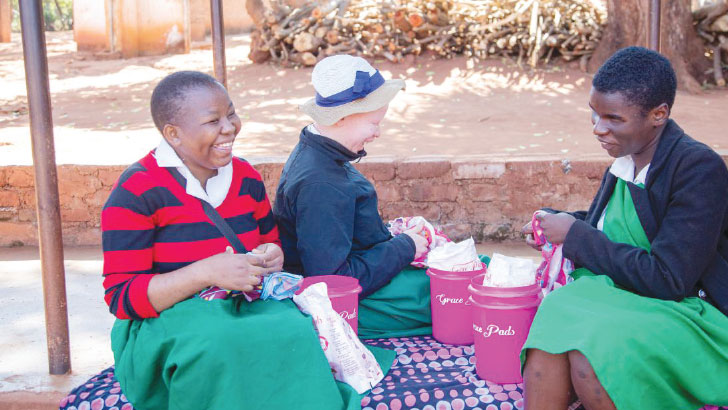My periods, a big surprise
Despite the fact that menstruation is a normal healthy biological process, it remains a taboo and a topic often discussed discreetly in most communities in Malawi.
As a result, most girls only know about menstruation once they start their periods.
Having grown up blind and in a community where no one talks about periods, Emelesi was clueless when she got her first menses.
On that day, she hardly noticed anything until her mother saw her stained dress and lovingly helped her to change.

She then taught Emelesi how to wear, wash and discreetly dry her menstrual cloths locally known as “zimwere”. She also taught her how to avoid leakages, handle period cramps in addition to a long discussion on boys and pregnancy.
“Organising, folding and wearing cloths during menses is not easy for a blind person. If I don’t fold them correctly, they feel uncomfortable and hurt. Keeping them dry is also not easy.
“Traditionally, one cannot hang their period cloths out in the sun, so they do not dry properly and often smell bad. In winter, I sometimes wear wet cloths,” says Emelesi.
She adds that periods also reduce her physical activities. She cannot play and run around as much as she would like. She mostly keeps to herself and sometimes misses school especially if she feels that she may have a leakage, which often attracts jeers from boys.
Periods during the pandemic
Emelesi is now in boarding school at Malingunde Resource Centre School for the Blind. To make her life easy, her parents bought her disposable sanitary pads.
“I used the pads during my first term here. They were comfortable, soft and light,” she says.
However, during the pandemic, schools closed and Emelesi had to go back home.
“My father had a tough time with his small business. Things slowed down and he could not afford a lot of necessities, including disposable sanitary pads. So, I started using cloths again,” she adds.
With the schools reopening last September, Emelesi is back in school where she has received a sanitary pack from the Water and Environment Sanitation (WES) Network, which Unicef Malawi is part of.
“The sanitary pack has 10 reusable pads. They are comfortable, easy to put on, soft and dry easily. They are better than the cloths that I use back home,” Emelesi says, adding that: “These will make my life easy.”
Mrs Lungu, a matron at Emelesi’s school, wants sanitary pads to be accessible to every girl, including girls with disabilities.
“Pads make the girls’ lives easy. They allow the girls to live freely and comfortably and enjoy their childhood,” she says.
Unicef Support
Unicef Malawi’s adolescent development specialist Clara Chindime says apart from lack of access to hygienic sanitary towels, girls in Malawi have inadequate water, sanitation, and hygiene facilities in schools.
She adds that they also do not have change rooms, disposal facilities for used sanitary materials and often must cope with menstruation-related taboos.
In response, Unicef Malawi is supporting the Ministry of Education to develop a standardised training manual on menstrual hygiene and will support over 50 schools with skills to make home-made safe reusable pads, buckets, and soap for handwashing.
Unicef Malawi will also support 30 000 learners and 50 mother groups and teachers with menstrual hygiene management information to help reduce stigma and discrimination during menstruation.
In addition, with support from Unicef Switzerland, Unicef Germany, Unicef Norway and the Basque Government, Unicef Malawi will support seven schools with climate-resilient water supply facilities to help improve hygiene during menstruation in school.





